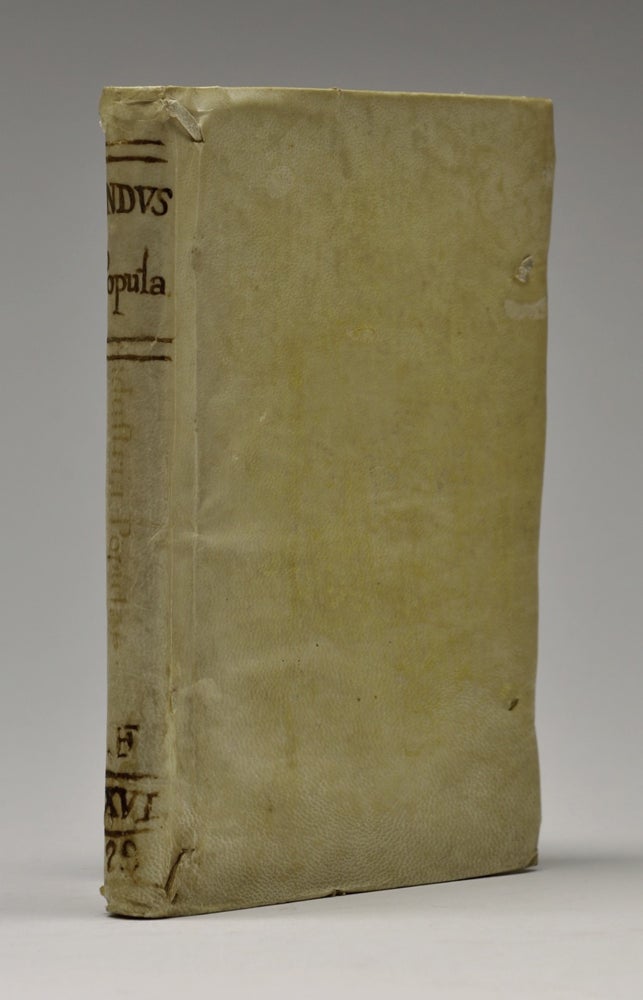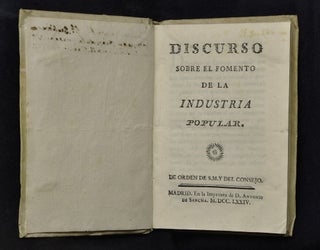Discurso sobre el fomento de la industria popular
Madrid: Antonio de Sancha, 1774. FIRST EDITION. Hardcover. 8vo. (4 ff.), cxcviii pp. Bound in contemporary stiff vellum, evidence of two pair of ties. Text very crisp & clean. Very good. Item #484
True first edition of this crucial work on bringing parity to the tradesmen in Spain, with particular emphasis in reforming the Spanish economy.
Conde de Campomanes "probably influenced Spanish economic thought of his time more than any other writer" (La Force p. 156). The present work is described as: "one of the fundamental books of the Spanish Enlightenment" (Venturi, Italy and the Enlightenment. Studies in a Cosmopolitan Century, p. 274).
Campomanes advocates household industry - mainly textiles - rather than large-scale industry, so that people will not have to move from small towns and farms. In order to spread the knowledge that would make such industry possible, he strongly advocates the formation of local economic societies. Campomanes analyzes the natural resources, existing industry, and available manpower of each Spanish province (section X); he also makes sociological observations on what Spaniards consume and why. When the Discurso appeared, the King ordered copies sent to all local governing officials and bodies of Spain and to bishops for distribution among the clergy. The work was supplemented in 1775 by "Discurso sobre la educacion popular de los artesanos y su fomento." Carpenter, in discussing why this work did not qualify for the Baker Library's exhibition of economic bestsellers printed before 1850, speculates "[Campomanes] was translated into Dutch, German, Italian and Portuguese, and ordinarily, such widespread translating indicates a considerable number of editions in the original. Yet, in this case there appears to have been only one. Perhaps, as a major figure in the government of Charles III, his prominence led to very large initial edition" (Economic Bestsellers Before 1850, p. 2). ¶ In "Additions and Corrections" Carpenter notes that according to Antonio Conca, the translator of the 1787 Italian edition (pp. ii-iii), there were two Spanish editions dated 1774. The first consisted of 5,000 copies; the second, of 40,000 copies, which the government distributed to parishes throughout the country. Moreover, Carpenter compared the two editions at Hitotsubashi University, Tokyo, finding them to be from different settings of type, but with the same pagination and text on the title page, distinguishable as follows: in the true first edition on p. iv the last line begins "nado" not "disciplinado"; while on p. cxcviii the first line begins "dad economica" instead of "cada provincia". The present copy contains both "points" indicating that it belongs to the original edition. * Because Campomanes (1723-1803) was a leading minister of D. Carlos III, his economic philosophy, of the liberal, mercantilist school, had an enormous impact on Spain's economy. Among his reforms were free trade with America, tax exemptions for many raw materials, duties on more imports, and the creation of a national bank. Campomanes' achievements were widely recognized abroad: for instance, Benjamin Franklin welcomed him as a member of the American Philosophical Society merely on the basis of what had been printed about him in the newspapers. Campomanes also wrote on a wide range of political, legal, and historical matters. * REFERENCES: Palau 273681. Sempere y Guarinos II, 79-83: with extensive discussion of the contents; on the author, see also II, 42-107. Colmeiro, Diccionario de los economistas espa oles pp. 54-55. Kress 6998. See also Herr, Eighteenth-Century Revolution in Spain pp. 50-51, 155-56, 162; La Force, Development of the Spanish Textile Industry 1750-1800 pp. 156, 157, 158; and Callahan, Honor, Commerce and Industry in Eighteenth-Century Spain (Kress Library publ. 22), passim.
Price: $600.00


